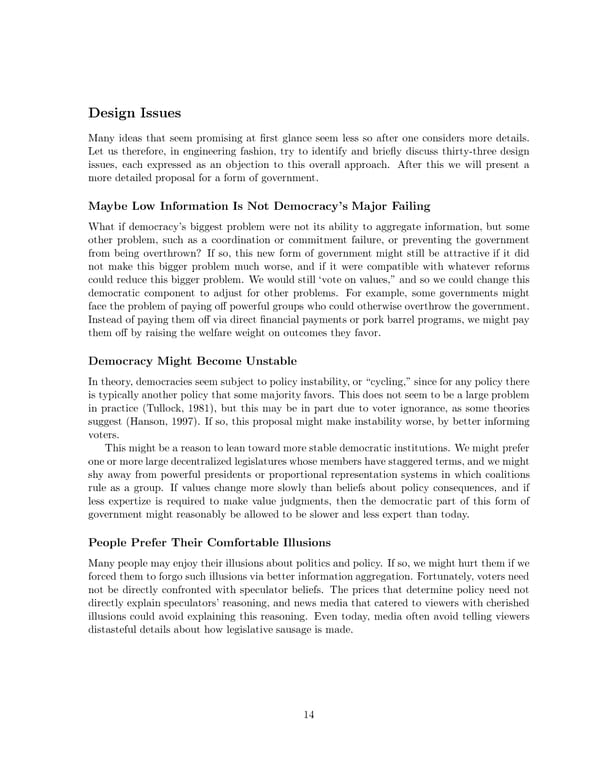Design Issues Many ideas that seem promising at first glance seem less so after one considers more details. Let us therefore, in engineering fashion, try to identify and briefly discuss thirty-three design issues, each expressed as an objection to this overall approach. After this we will present a more detailed proposal for a form of government. Maybe Low Information Is Not Democracy’s Major Failing What if democracy’s biggest problem were not its ability to aggregate information, but some other problem, such as a coordination or commitment failure, or preventing the government from being overthrown? If so, this new form of government might still be attractive if it did not make this bigger problem much worse, and if it were compatible with whatever reforms could reduce this bigger problem. We would still ‘vote on values,” and so we could change this democratic component to adjust for other problems. For example, some governments might face the problem of paying off powerful groups who could otherwise overthrow the government. Instead of paying them off via direct financial payments or pork barrel programs, we might pay them off by raising the welfare weight on outcomes they favor. Democracy Might Become Unstable In theory, democracies seem subject to policy instability, or “cycling,” since for any policy there is typically another policy that some majority favors. This does not seem to be a large problem in practice (Tullock, 1981), but this may be in part due to voter ignorance, as some theories suggest (Hanson, 1997). If so, this proposal might make instability worse, by better informing voters. This might be a reason to lean toward more stable democratic institutions. We might prefer one or more large decentralized legislatures whose members have staggered terms, and we might shy away from powerful presidents or proportional representation systems in which coalitions rule as a group. If values change more slowly than beliefs about policy consequences, and if less expertize is required to make value judgments, then the democratic part of this form of government might reasonably be allowed to be slower and less expert than today. People Prefer Their Comfortable Illusions Manypeople mayenjoytheir illusions about politics and policy. If so, we might hurt them if we forced them to forgo such illusions via better information aggregation. Fortunately, voters need not be directly confronted with speculator beliefs. The prices that determine policy need not directly explain speculators’ reasoning, and news media that catered to viewers with cherished illusions could avoid explaining this reasoning. Even today, media often avoid telling viewers distasteful details about how legislative sausage is made. 14
 Shall We Vote on Values, But Bet on Beliefs? Page 15 Page 17
Shall We Vote on Values, But Bet on Beliefs? Page 15 Page 17